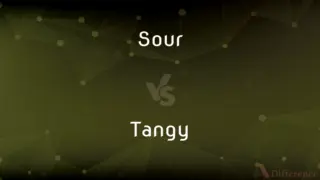Group vs. Cohort — What's the Difference?
By Tayyaba Rehman — Updated on September 14, 2023
A Group is a collection of individuals, often with a common purpose, while a Cohort refers to a specific subset of a group, often sharing a particular characteristic or experience.

Difference Between Group and Cohort
Table of Contents
ADVERTISEMENT
Key Differences
A Group refers to a collection of individuals or entities that come together for a common goal, activity, or interest. A Cohort, on the other hand, usually denotes a more specific subset of a group defined by a particular characteristic, such as age, time frame, or experience.
In a Group, membership may be open and diverse, allowing anyone who shares the common purpose to join. A Cohort often involves a more closed set of criteria for membership, usually based on specific qualifiers like demographic information, common experiences, or certain metrics.
Groups are often formed for broad purposes, such as social clubs, professional organizations, or academic classes. Cohorts are usually more focused in their objectives, often used in research studies to examine how certain variables affect a specific subset of a population.
In the English language, the term Group can be applied in many contexts and is more general in its meaning. Cohort is more specialized, often used in scientific research, academic settings, or specialized training programs.
Comparison Chart
Scope
General
Specific
ADVERTISEMENT
Membership
Open
Closed
Objectives
Broad
Focused
Usage
Common
Specialized
Criteria
Less Defined
More Defined
Compare with Definitions
Group
A group of people who enjoy hiking.
Our hiking group meets every weekend.
Cohort
Veterans of a specific war.
The Vietnam War cohort shares unique experiences.
Group
A group with diverse members.
The book club is open to everyone.
Cohort
A cohort in a medical study.
The cohort consisted of smokers aged 40-50.
Group
A group for social interactions.
We formed a group to discuss politics.
Cohort
Students entering college in the same year.
The 2020 cohort graduated despite challenges.
Group
An assemblage of persons or objects gathered or located together; an aggregation
A group of dinner guests.
A group of buildings near the road.
Cohort
People born in a specific time frame.
The millennial cohort is tech-savvy.
Group
A set of two or more figures that make up a unit or design, as in sculpture.
Cohort
A cohort in a specialized program.
The coding bootcamp cohort starts next month.
Group
A number of individuals or things considered or classed together because of similarities
A small group of supporters across the country.
Cohort
An ancient Roman military unit, comprising six centuries, equal to one tenth of a legion.
Group
(Linguistics) A category of related languages that is less inclusive than a family.
Cohort
A group of people with a shared characteristic
A cohort of civil servants patiently drafting legislation
Group
A military unit consisting of two or more battalions and a headquarters.
Cohort
A supporter or companion
Young Jack arrived with three of his cohorts
A long-time cohort of the band
Group
A unit of two or more squadrons in the US Air Force, smaller than a wing.
Cohort
A group or band of people.
Group
Two or more atoms behaving or regarded as behaving as a single chemical unit.
Cohort
A companion or associate.
Group
A column in the periodic table of the elements.
Cohort
A generational group as defined in demographics, statistics, or market research
“The cohort of people aged 30 to 39 ... were more conservative” (American Demographics).
Group
(Geology) A stratigraphic unit, especially a unit consisting of two or more formations deposited during a single geologic era.
Cohort
One of the 10 divisions of a Roman legion, consisting of 300 to 600 men.
Group
(Mathematics) A set, together with a binary associative operation, such that the set is closed under the operation, the set contains an identity element for the operation, and each element of the set has an inverse element with respect to the operation. The integers form a group under the operation of ordinary addition.
Cohort
A group of soldiers.
Group
Of, relating to, constituting, or being a member of a group
A group discussion.
A group effort.
Cohort
A group of people supporting the same thing or person.
Group
To place or arrange in a group
Grouped the children according to height.
Cohort
(statistics) A demographic grouping of people, especially those in a defined age group, or having a common characteristic.
The 18-24 cohort shows a sharp increase in automobile fatalities over the proximate age groupings.
Group
To belong to or form a group
The soldiers began to group on the hillside.
Cohort
Any division of a Roman legion, normally of about 500 or 600 men (equalling about six centuries).
Three cohorts of men were assigned to the region.
Group
A number of things or persons being in some relation to one another.
There is a group of houses behind the hill;
He left town to join a Communist group
A group of people gathered in front of the Parliament to demonstrate against the Prime Minister's proposals.
Cohort
An accomplice; abettor; associate.
He was able to plea down his sentence by revealing the names of three of his cohorts, as well as the source of the information.
Group
(group theory) A set with an associative binary operation, under which there exists an identity element, and such that each element has an inverse.
Cohort
Any band or body of warriors.
Group
An effective divisor on a curve.
Cohort
(taxonomy) A natural group of orders of organisms, less comprehensive than a class.
Group
A (usually small) group of people who perform music together.
Did you see the new jazz group?
Cohort
A colleague.
Group
(astronomy) A small number (up to about fifty) of galaxies that are near each other.
Cohort
A set of individuals in a program, especially when compared to previous sets of individuals within the same program.
The students in my cohort for my organic chemistry class this year are not up to snuff. Last year's cohort scored much higher averages on the mid-term.
Group
(chemistry) A column in the periodic table of chemical elements.
Cohort
To associate with such a group
Group
(chemistry) A functional group.
Nitro is an electron-withdrawing group.
Cohort
A body of about five or six hundred soldiers; the tenth part of a legion.
Group
(sociology) A subset of a culture or of a society.
Cohort
Any band or body of warriors.
With him the cohort brightOf watchful cherubim.
Group
(military) An air force formation.
Cohort
A natural group of orders of plants, less comprehensive than a class.
Group
(geology) A collection of formations or rock strata.
Cohort
A company of companions or supporters
Group
(computing) A number of users with the same rights with respect to accession, modification, and execution of files, computers and peripherals.
Cohort
A band of warriors (originally a unit of a Roman Legion)
Group
An element of an espresso machine from which hot water pours into the portafilter.
Cohort
A group people having approximately the same age
Group
(music) A number of eighth, sixteenth, etc., notes joined at the stems; sometimes rather indefinitely applied to any ornament made up of a few short notes.
Group
(sports) A set of teams playing each other in the same division, while not during the same period playing any teams that belong to other sets in the division.
Group
(business) A commercial organization.
Group
(transitive) To put together to form a group.
Group the dogs by hair colour
Group
(intransitive) To come together to form a group.
Group
A cluster, crowd, or throng; an assemblage, either of persons or things, collected without any regular form or arrangement; as, a group of men or of trees; a group of isles.
Group
An assemblage of objects in a certain order or relation, or having some resemblance or common characteristic; as, groups of strata.
Group
A variously limited assemblage of animals or plants, having some resemblance, or common characteristics in form or structure. The term has different uses, and may be made to include certain species of a genus, or a whole genus, or certain genera, or even several orders.
Group
A number of eighth, sixteenth, etc., notes joined at the stems; - sometimes rather indefinitely applied to any ornament made up of a few short notes.
Group
To form a group of; to arrange or combine in a group or in groups, often with reference to mutual relation and the best effect; to form an assemblage of.
The difficulty lies in drawing and disposing, or, as the painters term it, in grouping such a multitude of different objects.
Group
Any number of entities (members) considered as a unit
Group
(chemistry) two or more atoms bound together as a single unit and forming part of a molecule
Group
A set that is closed, associative, has an identity element and every element has an inverse
Group
Arrange into a group or groups;
Can you group these shapes together?
Group
Form a group or group together
Group
A department in a company.
The marketing group handles advertising.
Group
A group formed for a short time.
We are a study group for the finals.
Common Curiosities
Can anyone join a Group?
Often, depending on its purpose.
Is Cohort membership restricted?
Usually, based on specific criteria.
What is a Cohort?
A specific subset of a group with common characteristics.
What is a Group?
A collection of individuals with a common purpose.
How long does a Group last?
Varies, from temporary to permanent.
Is a Group always social?
Not necessarily; it can be professional or academic.
Can a Group be large?
Yes, size can vary widely.
Can Groups be informal?
Yes, they can be casual or formal.
Is a Cohort used in research?
Often, to study specific variables.
Is a Cohort always time-bound?
Often, especially in research or academic settings.
Is a Cohort typically smaller than a Group?
Generally, it is a subset.
Do Groups have leaders?
Often, but not always.
Is a Cohort more formal?
Often, especially in academic or research settings.
Do Cohorts have specific objectives?
Usually, especially in research.
Can you have a Cohort within a Group?
Yes, a cohort is often a specific subset of a group.
Share Your Discovery

Previous Comparison
Drapery vs. Tapestry
Next Comparison
Sour vs. TangyAuthor Spotlight
Written by
Tayyaba RehmanTayyaba Rehman is a distinguished writer, currently serving as a primary contributor to askdifference.com. As a researcher in semantics and etymology, Tayyaba's passion for the complexity of languages and their distinctions has found a perfect home on the platform. Tayyaba delves into the intricacies of language, distinguishing between commonly confused words and phrases, thereby providing clarity for readers worldwide.














































